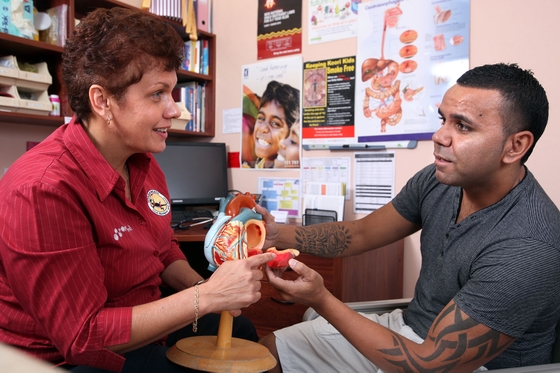
COVID-19 and the flu vaccine
Getting a flu shot now will help in the fight against influenza.
What does the flu vaccine have to do with heart disease?
Your risk of having a heart attack is six times higher in the week after a bout of the flu. Viruses like influenza ‘the flu’ can cause an inflammatory response in your body, placing strain on your heart; this could lead to heart failure or an abnormal heartbeat. The flu can also destabilise plaque in your blood vessels, and this can cause a blockage and possible heart attack.
The flu vaccine helps to prevent the flu and protect your heart.
Since the COVID-19 pandemic flu cases are on the rise, making it even more important to get the flu vaccine.
To help look after your heart, you should get the vaccine before the flu season starts to peak in June.
How do I get my flu vaccine?
People with heart disease, people 65 years and over and Aboriginal and Torres Strait Islander peoples are among those eligible to receive a free flu shot every year under the National Immunisation Program.
Note that your healthcare provider may charge a consultation fee for the visit. You can check this when you make your appointment.
Call your doctor or pharmacist to book in your flu vaccine today.
Visit the Department of Health website for more information on influenza vaccination
References
- Kwong JC, Schwartz KL, Campitelli MA, et al. Acute Myocardial Infarction after Laboratory-Confirmed Influenza Infection. New England Journal of Medicine. 2018;378(4):345-353. doi:10.1056/NEJMoa1702090
- Madjid M, Aboshady I, Awan I, Litovsky S, Casscells SW. Influenza and cardiovascular disease: is there a causal relationship? Tex Heart Inst J. 2004;31(1):4-13.
- Australian Government Department of Health and Aged Care. Australian Influenza Surveillance Report. Accessed 19th Februrary, 2024. https://www.health.gov.au/sites/default/files/2023-08/aisr-fortnightly-report-no-9---24-july-to-6-august-2023.pdf
You might also be interested in...

COVID-19 and cardiovascular disease
If you have cardiovascular disease, you are at higher risk of serious complications from COVID-19, including having to go to hospital.

First Nations heart health
More First Nations people are impacted by cardiovascular (CVD) than other Australians.

What is heart disease?
Heart disease is a major cause of health problems and death in Australia, but it’s often preventable. Learn more about the different types of heart disease.
Last updated09 March 2024
Last reviewed19 February 2024